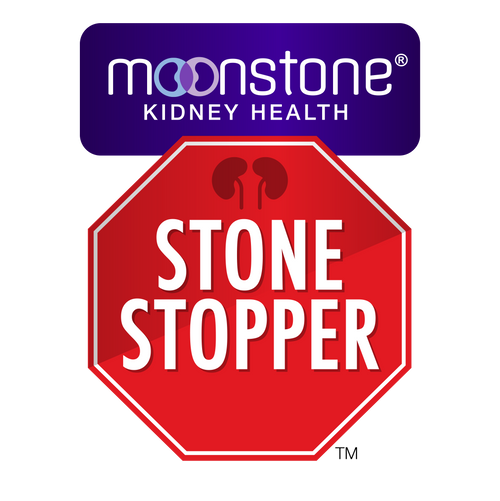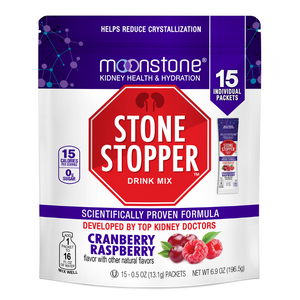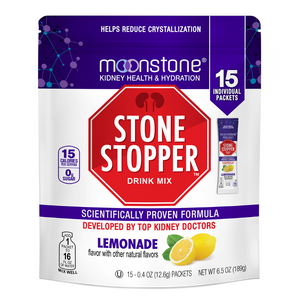Kidney stones can be incredibly painful and are more common than you might think. The good news is that one of the most important factors in preventing kidney stone formation is right at your fingertips: your diet. In this comprehensive guide, we'll delve into the world of low-oxalate diets and how they can promote optimal kidney health.
The Importance of Hydration
Preventing Stone Build-Up: One of the simplest and most effective ways to deter kidney stone formation is by staying well-hydrated. Drinking plenty of water ensures frequent urination, helping to flush out minerals like calcium and uric acid that can contribute to stone formation.
To maintain optimal kidney health, it's essential to choose your beverages wisely. Aim to consume 2-3 quarts of fluids or 8-12 cups daily to maintain healthy urine volume. Water, coffee, and lemonade are excellent choices, while sodas, sweetened iced tea, and grapefruit juice should be avoided, especially if they are high in fructose.
The Impact of Sweat: While saunas, hot yoga, and strenuous exercise are generally good for your overall health, they can also lead to kidney stones due to excessive sweating. Sweating can decrease urine production, allowing stone-causing minerals to accumulate in the kidneys and urinary tract. Ensuring hydration, especially during these activities, is crucial.

Tailoring Your Diet
No One-Size-Fits-All Diet: It's important to understand that there's no single diet plan for preventing kidney stones. Recommendations vary based on the type of stones and individual factors.
Calcium Oxalate Stones: The Most Common Type
The Calcium Myth: Calcium isn't the enemy; in fact, it's part of the solution. Consuming calcium-rich foods like milk, yogurt, and certain cheeses along with oxalate-rich foods during a meal can help prevent stone formation. Avoid reducing dietary calcium, as it can increase the risk of developing kidney stones.
Beware of Sodium: Excessive sodium intake can lead to more calcium being excreted in your urine, increasing the risk of kidney stones. High sodium sources include processed foods, restaurant meals, and fast food. Opt for fresh, low-sodium options to reduce calcium leakage in your urine and manage blood pressure.
Uric Acid Stones: Another Common Culprit
Purines and Uric Acid: Foods like red meat, organ meats, and shellfish are high in purines, which can lead to increased uric acid production. Elevated uric acid levels create more acidic urine, making it easier for uric acid stones to form.
Balancing Act: To prevent uric acid stones, reduce high-purine foods and embrace a diet rich in vegetables, fruits, whole grains, and low-fat dairy products. Limit sugar-sweetened items and alcohol, as they can elevate uric acid levels.

General Diet Recommendations
- Hydration Is Key: Aim for 2-3 quarts of fluids daily, including water, coffee, and non-fructose-containing lemonade. This helps maintain diluted urine and a healthy urine volume of at least 2.5 liters daily.
- Embrace Dietary Calcium: Consume three servings of dairy per day alongside oxalate-rich foods during meals.
- Caution with Supplements: Consult your physician and a registered dietitian before taking calcium supplements.
- Moderate Protein Intake: High protein intake increases calcium excretion, potentially leading to stone formation.
- Watch Your Salt: High sodium intake increases urinary calcium, elevating the risk of stone development.
- Limit High-Dose Vitamin C Supplements: Stick to the recommended daily dose to avoid excess oxalate production.
Optimal Food Choices for a Low-Oxalate Diet
When pursuing a low-oxalate diet, it's essential to choose foods that are naturally low in oxalates, ensuring you maintain a healthy and balanced diet. Here's a list of foods that you can savor without concern:
- Fruits: Enjoy the delightful flavors of bananas, blackberries, blueberries, cherries, strawberries, apples, apricots, lemons, and peaches.
- Vegetables: Satisfy your veggie cravings with mustard greens, broccoli, cabbage, cauliflower, mushrooms, onions, peas, and zucchini.
- Grains and Starches: As a source of sustenance, opt for white rice, corn flour, and oat bran.
- Proteins: Maintain your protein intake with eggs, meat, fish, and poultry.
- Dairy Products: Dairy lovers, rejoice! You can include yogurt, cheese, milk, and butter in your diet.
- Beverages: Keep yourself hydrated and refreshed with coffee, water, and fruit juice.
- Herbs and Spices: Add flavor to your dishes with herbs and spices such as cinnamon, cilantro, cumin, and dill.
Excluded Foods on a Low-Oxalate Diet
To effectively manage your oxalate intake, it's equally important to know which foods to avoid. Here's a list of foods that are high in oxalates and should be limited or omitted from your low-oxalate diet:
- Fruits: Steer clear of rhubarb, kiwis, dates, raspberries, oranges, and tangerines.
- Vegetables: Exercise caution with spinach, chard, potatoes, beets, turnips, yams, okra, and carrots.
- Legumes: Limit your consumption of navy beans, fava beans, kidney beans, and refried beans.
- Nuts: Nuts like almonds, walnuts, pistachios, macadamia nuts, and cashews should be consumed in moderation.
- Seeds: Be mindful of sunflower seeds and pumpkin seeds.
- Chocolate and Cocoa: Sadly, chocolate and cocoa products should be reserved for occasional indulgences.
- Grains and Starches: Avoid brown rice, couscous, millet, bulgur, cornmeal, and corn grits.
- Beverages: Certain beverages like chocolate milk, hot chocolate, tea, and tomato juice should be consumed sparingly.
- Soy Products: Tofu, soybeans, and soy burgers contain higher oxalate levels and should be used with caution.

Pro Tip: Remember that soaking and cooking can significantly reduce the oxalate content of many vegetables and legumes, making them more suitable for a low-oxalate diet.
By making informed choices from these food lists and consulting with a healthcare provider or dietitian, you can effectively embrace a low-oxalate diet tailored to your specific needs and enjoy better kidney health.
Managing Your Low-Oxalate Diet
- Knowledge is Power: Familiarize yourself with high-oxalate foods and beverages to make informed dietary choices.
- Balancing Breakfast: Cereal lovers can choose low-oxalate options and pair them with dairy.
- Selective Snacking: Keep low-oxalate snacks like cheese, fruit, and popcorn on hand for between-meal cravings.
- Dessert Harmony: Enjoy desserts in moderation, balancing them with low-oxalate options.
- Restaurant Wisdom: When dining out, research menus beforehand and don't hesitate to make special requests if necessary.
Moonstone, known for its fluid retention-reducing properties, can be a valuable ally in your low-oxalate diet journey. Discover Moonstone's exceptional range of products right here.
Staying on the Path to Kidney Health
- Regular Check-Ups: Schedule periodic stone risk assessments and dietary guidance sessions with your healthcare provider.
- Nutritional Expertise: Consult a registered dietitian for personalized low-oxalate meal planning tailored to your specific needs.
- Lifestyle Integration: Make regular exercise and weight management part of your lifestyle to further reduce your risk of kidney stone formation.
- Community Connection: Join online forums or local support groups to share experiences, gather tips, and find encouragement on your low-oxalate diet journey.

Preventing kidney stones is an active and empowering endeavor, and your diet plays a crucial role in achieving optimal kidney health. Staying well-hydrated, making informed dietary choices, and incorporating Moonstone's unique benefits into your routine can significantly reduce your risk of kidney stone formation.
Remember, knowledge is your greatest ally in mastering your diet for the benefit of your kidneys. For personalized guidance, consult healthcare professionals and seek support from others who share your journey toward kidney stone prevention.






1 comment
Hello, Moonstone Supporters,
I read your recommendations and realized how much I still needed to learn about managing my early stage kidney disease. Thank you for your suggestions. I will look forward to reading posts from others and their journey. Here’s to better health for us all.
Patricia